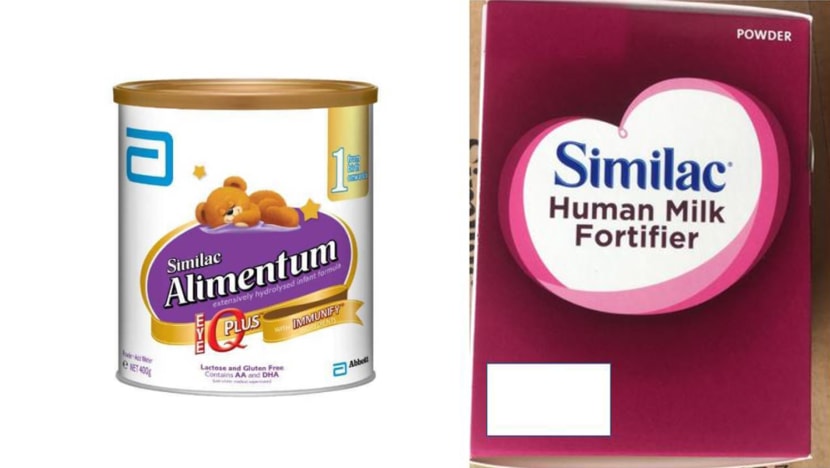Recalled Abbott infant formula products used in 9 hospitals, investigations ongoing to determine extent of use: MOH

The affected Abbott instant formula products are Abbott Similac Alimentum powdered infant formula packaged in 400g tins and Similac Human Milk Fortifier in 0.9g sachets. (Photos: Singapore Food Agency)
SINGAPORE: Nine hospitals in Singapore have confirmed the use of recalled Abbott infant formula products, and investigations are ongoing to determine the extent of use, said the the Ministry of Health (MOH) on Wednesday (Feb 23).
In a press release, MOH advised all public and private hospitals to stop the use of the two products - Abbott Similac Alimentum powdered infant formula, packaged in 400g tins, and Similac Human Milk Fortifier in 0.9g sachets.
The recalls - the Abbott Similac Alimentum last Saturday and the Similac Human Milk Fortifier on Wednesday - were issued by the Singapore Food Agency (SFA) to Abbott Laboratories, due to possible Cronobacter sakazakii and Salmonella Newport contamination. Both products are from the United States.
Cronobacter sakazakii is a bacterium found in the environment that can survive dry conditions, such as dry food like infant formula and powdered milk, said MOH.
The bacterium cannot be spread from person to person.
Meanwhile, Salmonella Newport is a bacterium that can be found in many foods, including vegetables, meat and processed food. Salmonella can be transmitted via the consumption of contaminated food.
"Investigations are ongoing to determine the extent of use of the implicated products in our hospitals," said MOH.
To date, nine hospitals have confirmed the use of the implicated products. They are:
- Gleneagles Hospital
- KK Women's and Children's Hospital
- Mount Alvernia Hospital
- Mount Elizabeth Hospital
- Mount Elizabeth Novena Hospital
- National University Hospital
- Raffles Hospital
- Singapore General Hospital
- Thomson Medical Centre.
"We are working with the hospitals to identify and contact parents and caregivers of patients who might have received the products, to advise them on the actions to be taken," said the Health Ministry.
To date, the hospitals have not reported any case of adverse events arising from the consumption of these products. MOH said it will continue to monitor the situation closely.
SFA ISSUES RECALL OF AFFECTED ABBOTT INSTANT FORMULA PRODUCTS
On Saturday, SFA said Abbott Laboratories was directed to recall "implicated batches" of Abbott Alimentum due to the possible presence of Cronobacter sakazakii and Salmonella Newport, both pathogenic bacteria.
In another news release on Wednesday, SFA directed the recall of the second affected product - Similac Human Milk Fortifier.
It has an expiry date of Apr 1, 2022 or later. The code on the container of affected batches contains K8, SH or Z2, with the first two digits of the code running from 22 to 37.
SFA said the recall for both affected products has been completed.
Consumers may reach out to the importer, Abbott Laboratories at 6278 6220 or email family.sg [at] abbott.com for any clarification.
CAREGIVERS TOLD TO STOP USING IMPLICATED PRODUCTS IMMEDIATELY
Parents and caregivers of infants who have purchased the implicated infant formula products from retail outlets should also stop using them immediately, said MOH.
They should seek immediate medical treatment if their infants become unwell after consuming the implicated products.
"Cronobacter infections are generally rare," said MOH.
When associated with serious infections such as meningitis in infants, it may be fatal. It can also cause serious illness among people with immunocompromised conditions and the elderly.
For infants with Cronobacter infections, they may show symptoms such as fever, crying, poor feeding or lethargy. Some may also develop symptoms, said MOH.
For some individuals with Salmonella infection, they may not develop any symptoms, while others may have diarrhoea, fever and abdominal cramps. More severe cases may experience high fever, aches, headaches, lethargy, rash or blood in urine or stools.
Infants, young children under the age of five, the elderly aged 65 years and above as well as immunocompromised individuals are at higher risk of severe illness.
"The key to preventing Cronobacter and Salmonella infections lies in proper hygiene and preparation of formula milk," said the Health Ministry.














